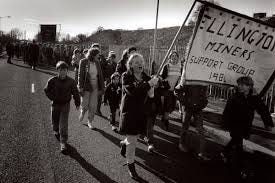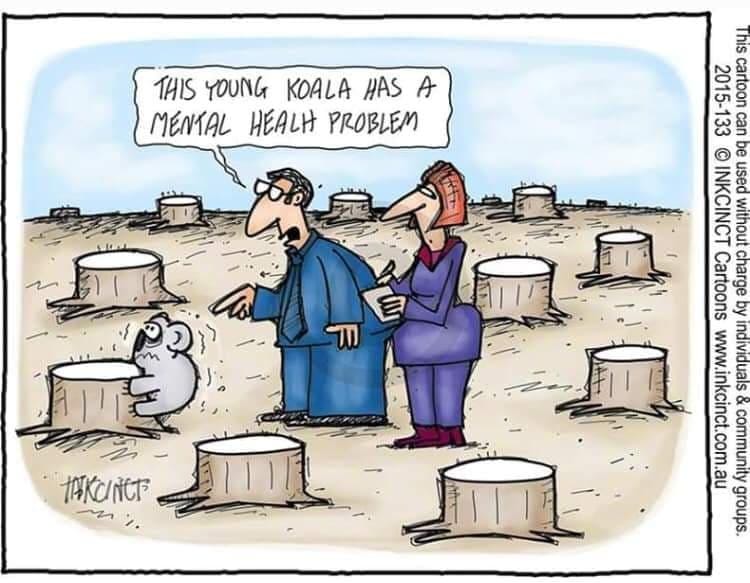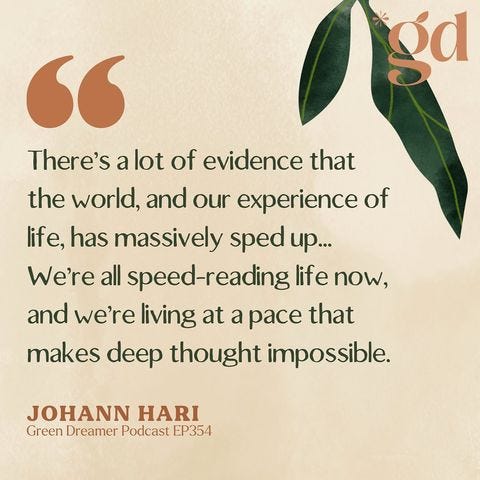Thinking of dismantling capitalism & making a just society today, wanna join?
Polite reminder to those in power that the just transition is ready to go whenever.
Help keep the Green Fix running! The newsletter is volunteer-run. If you find this newsletter useful, please consider tipping a virtual coffee.
***
Have you heard the news?
We’re in a resource crisis. No more time. The planet ran out of it. There’s only the present moment now.
Weird, because I used to have so much of it. Time. And we put so much work into allocating our time well. Measuring it, coveting it, justifying it, using it. Hell, we have been so efficient. They told us to be proud of exhaustion. It meant we were achieving something.
And sure, we produced a lot of Stuff. We have produced empires of waste. We have worked until our workers are burnt out and mentally and physically ill. We have been so busy that we gave up sleeping and resting and fun.
And still, the birds are dying and the trees are dead.
The planet never needed us to work harder and sacrifice more. A just and fair world does not ask us to choose between happiness and survival. Fixing the planet does not mean pushing ourselves to the brink. It does not require us to work jobs supporting economic systems that don’t support us back. It does not make us feel guilty for taking a break.
Creating a world that we want to live in is about slowing down. Burnt out people don’t change the system. There is no time to reflect on system change when we’re putting out wildfires.
Hell, I don’t even listen to your podcast recommendations and you expect me to have time to dismantle neocolonialism?
This current capitalist system is out of time. This way of living has used up all its minutes on stage. And what next?
In the wake of the old world, we are free to shape and create new time for the things that matter.
How many times do we need to say it? Restoring a liveable world does not need another time management app and hustle culture. I don’t want pills to help me sleep through my racing thoughts, I don’t want to read quick summaries of the issues that shape our entire lives. I don’t want your hot Twitter takes and promises that we’ll develop carbon storage solutions if we just work a bit harder.
I want to own my own time again. To plant trees and sleep. I want to talk to people long enough to listen to them. I want to read and learn and reflect on issues, not just assume and ignore. I want to do - I am going to do - all the things that we dismiss as something we’d love to do ‘if we had the time.’
Restoration of the forests and connection with our community and deep learning and unlearning - do you think of any of these things can be summarised with a TL;DR? Care, connection and justice are not developed by rushing. But building a society on those foundations - carefully, slowly - unlocks an abundant world of time and opportunity.
Of course we have the time. Time is all we have. We are not machines. We are not tied to this way of life. The planet isn’t either. When capitalist structures die, our lives begin to rewild again.
—
If you like this newsletter, please help me by sharing it using the button here:
What’s Going On?
New IPCC report: Limiting global heating to 1.5 degrees requires 43% decrease in emissions before 2030. Current pledges put us at 7%.
Useful: 10 key findings from latest UN climate report.Food waste makes up half of global food system emissions, new UN study finds.
Related: Reducing meat & dairy is a highly effective way to slash global food emissions.Remember that carbon offsetter that was making fake claims about their impact? They’ve promised to revamp their offsets programme.
Relevant: What indigenous people want from carbon credits.The world’s top 1% of emitters produce over 1000 times more CO2 than the bottom 1%.
Relate: Casual reminder that climate change is not about ‘overpopulation.’Restoring forests could offset a quarter of deforestation emissions in tropical regions.
Related: Saving rainforests could also prevent future pandemics.One woman is swimming 450km to raise awareness on textile waste colonialism. Here’s what that means.
Useful: What even is waste colonialism?
Join our afterwork!
24th March, Bambino Central, the party kicks off at 19h. See you there?
Focus On… the Just Transition
Alexandra Vazquez-Mera talks to Magda-Sarah Boulabiza from ENAR and Miłosława Stępień from Bankwatch, about what a just transition actually means.
Miłosława Stępień, Miłka for short, is the Just Transition campaign coordinator at an international network of NGOs called CEE Bankwatch Network.
The Bankwatch Network calls for public money to be spent on climate-friendly development solutions that are not driven by economic growth, but that benefit society and the environment.
Magda-Sarah Boulabiza is the Policy and Advocacy Advisor at ENAR (European Networks Against Racism). ENAR works on European advocacy for racial justice.
What is a just transition?
Miłka: The concept of “just transition” was introduced by trade unions when discussions started around green energy in the 1980s. It was obvious that a lot of people from the energy sector would probably be losing their jobs and needed to switch to something else.
So, trade unions, linked to the mining and energy sectors especially, started talking about how this can be done so a support system is in place during the transition. That was the initial idea behind it, but it has grown to be something much larger right now.

It is not only about making sure that the people who are losing their jobs are being taken care of, but also that the vision of the future includes young people, women, and marginalised groups. That this vision of a society is sustainable, and creates a better life for all.
Magda: The climate crisis is a result of the interconnection between structural racism and neo-colonial capitalism. Racialized people are being exploited for the financial benefit of a few European states and elites. This has led to a system of oppression where certain groups, like the Sami or the Irish travellers, are being denied access to employment, social services, and a safe and healthy environment.
So, for us, the just transition is a transformative political, economic, and social framework that should be based on the principles of equity, justice, accountability, and participation in democracy.
How do we make a just transition happen?
Magda: In order to reach the just transition, it should undo the harm that is caused by this oppressive system of power. It should mitigate the already existing effects of the climate crisis on vulnerable groups in Europe. We believe this process starts by listening to the needs of vulnerable groups, which hasn’t been done.
We would start by decolonising the economy. This means shifting away from the endless growth mindset towards a more democratic, decolonial, and equitable economy that has accountability and care at the core.
This should be done through supporting and stimulating local economies and building community wealth amongst vulnerable groups. Solutions should also focus on decolonising the food system, decommodifying the land, and advocating for traditional agricultural knowledge.
We should also be working on reparations for historical harms and mainstreaming of race, gender, and disability in social and climate policy.
What is happening politically to ensure a just transition?
Miłka: We’re at a breakthrough point in history. The EU has decided to implement this enormous project, which is called the “European Green Deal. The Just Transition Mechanism (the allocated EU funding) has 3 pillars, but let’s just focus on the Just Transition Funds.
This is a specific fund that is designated for carbon intensive regions, mainly coal, but also cement, chemicals, steel. There are specific regions throughout Europe which have been focused on developing these industries, and these regions will receive money to “soften” the transition away from heavy carbon-intensive industries to a greener society.
For example, providing support for those groups of people who are losing their jobs. It looks at rehabilitating former mining sites, creating new purposes for them, and creating support for small and medium enterprises so they can develop into this new economy.
How can we have a just transition that uses the same political and economic structure without repeating the same problems?
Magda: There should be safe-guarding mechanisms against corporate greed and the destruction of the planet. We should make sure we have accountability and meaningful participation of people in democracy, especially now with the rise of the far right.
The climate movement should be more inclusive, otherwise it’ll leave an open space for eco-fascist movements to [push the myth that] overpopulation creates pollution and limit births in Global South countries.
Miłka: From my work over the last couple of years as an activist I’ve seen a huge movement forward and, from this perspective, I’m optimistic. The region that I’m from in Poland and a lot of the other regions that we work with, even a few years ago, were not talking about phasing out coal or other fossil fuels, and now they are.
One of the most effective ways of keeping companies accountable is through high levels of civic monitoring of the activities that are going on. We need society to be pushing for these changes, and the more society is pushing, voicing their opinions, making sure they vote for people who are on the right track, the faster we’ll go.
Check out ENAR’s recent report “The Climate Crisis is a (Neo)Colonial Capitalist Crisis: Experiences, Responses and Steps towards Decolonising Climate Action”. You can also follow ENAR on Twitter @ENAREurope and Instagram @enar.europe. You can follow Bankwatch on Twitter @ceebankwatch.
Full transcript of Magda’s interview here.
So Now What Do I Do?
LEARN MORE
How do you get the climate crisis taken to court? Join the World Youth 4 Climate Justice information session on the 25th March to find out about their campaign.
Where’s the money to tackle the climate crisis? Tune into the European Environmental Bureau’s webinar on the 28th March to find out.
TRY SOMETHING NEW
Under 30? Get your free ticket for the Social Enterprise World Forum on the 28th March!
Youth NGO ClimaTalk is looking for volunteers to join their EU Policy team. Apply before 30th March.
Apply by 7th April to become an International Youth Climate Ambassador in the run-up to COP28.
CHANGE THE SYSTEM
By the way…
In this podcast episode, European Greens tackle the Energy Charter Treaty (ECT), a highly litigated investment protection treaty that protects investments in fossil fuels, making it incompatible with the fight against climate change. It explores why the EU should #ExitTheECT. The first part of the podcast features Andrej Gnezda from Umanotera who examines one case where the ECT pushed Slovenia to weaken fracking rules. Then Sibylle Steffan sits down with Green MEP Anna Cavazzini, who has been leading the position of the Green Group in the European Parliament on the matter.
The Green Fix is now offering low-cost sponsored slots on the newsletter. Book your slot by emailing casshebron@gmail.com
If you have a topic you want the Green Fix to cover, fill out this feedback form & tell us your idea!
Stay in the loop
You can also follow the Green Fix Twitter and LinkedIn page here for more climate opportunities. You can also connect with me on Instagram, Twitter and LinkedIn.
Know someone interested in environmental issues? Forward this email to them - we want to reach people who care about doing more for the planet, with your help.










